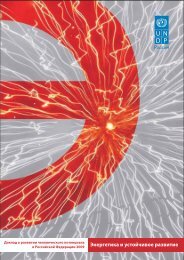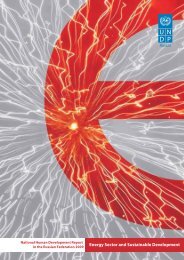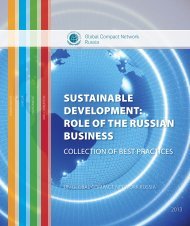Report - UNDP Russia
Report - UNDP Russia
Report - UNDP Russia
Create successful ePaper yourself
Turn your PDF publications into a flip-book with our unique Google optimized e-Paper software.
Chapter 5Energy-efficient <strong>Russia</strong>5.1. A more productive energysector is a preconditionfor human developmentEnergy efficiency in the economy can bemeasured by various indicators: energy intensityof GDP (energy consumed per unit of GDP);energy productivity (GDP per unit of energyconsumed); or an energy efficiency index (aspecial complex index measuring energyintensity changes due to improved efficiency inspecific sectors of the economy anddistinguishing the contribution of each tostructural changes).Energy intensity of GDP is the mostcommonly used indicator, but the most telling isenergy productivity, which is similar to laborproductivity. It goes up when energyconsumption for providing a specific energyservice is reduced, e.g. a compact luminescentlamp consumes 4-6 times less energy per unit ofluminous flux than an incandescent lamp, and a<strong>Russia</strong>n stove consumes 3-4 times less fuel perheat unit than an open fireplace.Increase of energy efficiency meanslower energy intensity of GDP and higherenergy productivity. Reduction of energyintensity can be achieved by technologicalimprovement (re-equipping), changes in theload parameters of industrial equipment, andby structural shifts in the economy, i.e. changesin the share of segments with different energyintensities due to their development atdifferent speeds. The energy efficiency index israrely used due to complexity of its calculation,but it shows the role of the technology factormore vividly.There are three laws of transformation forthe energy base of human development: the lawof relative stability of the share of energy supplyexpenditures for all end-users in gross product orGDP (exceeding threshold limits of this sharecauses economic slowdown); the law of growthin quality of energy used; and (following fromthese first two laws) the law of improved energyefficiency or of improved energy productivity.Human development has for centuries beenaccompanied by increase of energy productivity.In the last century and a half this indicator hasrisen by about 1% every year 1 and even faster inthe recent past.5.2. <strong>Russia</strong> is now a leaderby rate of reduction of energyintensity, but it is still oneof the most energy intensivecountries in the worldEnergy intensity of <strong>Russia</strong>n GDP fell byalmost 5% each year in 2000–2008, which ismuch faster than in many other countries. Butenergy intensity of <strong>Russia</strong>’s GDP in 2006 was still2.5 times higher than the world average and 2.5-3.5 times higher than in developed countries(Figure 5.1) 2 .High energy intensity of <strong>Russia</strong>n GDP isnot the price paid for a cold climate, but thelegacy of a centrally planned economy, which isstill lingering after 17 years. It is interesting tonote that energy efficiency in Tsarist <strong>Russia</strong> was3.5 times higher than in Germany, 3 times higherthan in France and Japan, 4.4 times higher than inthe UK and USA and 3.5 times higher than theworld average.Four fifths of growth in demand forenergy in 2000–2007 was met by rising energyefficiency. Structural changes in the economyand growing utilization of production capacitiesin the process of ‘recovery growth’ wereimportant factors in reduction of energyintensity. Transition to investment growth in2005–2007 greatly reduced input from thesefactors. Introduction of new technologies hasonly given 1% annual reduction of energyintensity, which is comparable with the results1In the USA and Great Britain in 1850-2005 energy intensity of GDP declined by about 1% annually and in France by 0.5%, in Canada in 1920-2005 it declined by 0.7% annually. In 155 years energy productivity in the USA has risen by 5 times and in the UK by 4.6 times.2<strong>Russia</strong>’s CENEf (Center for Energy Efficiency) estimates that energy intensity of <strong>Russia</strong>n GDP declined by 4.5% in 2008, but the decline mayslow down to 2-3% per year during the economic crisis in 2009-201090 National Human Development <strong>Report</strong> in the <strong>Russia</strong>n Federation 2009












